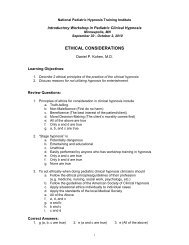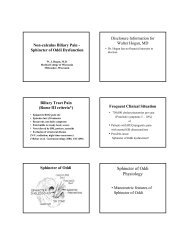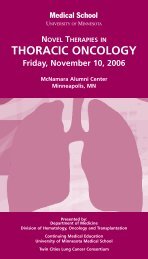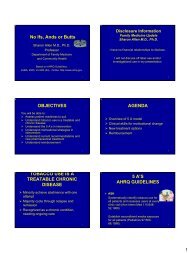Understanding & Discussing Women's Sexual Functioning: How to ...
Understanding & Discussing Women's Sexual Functioning: How to ...
Understanding & Discussing Women's Sexual Functioning: How to ...
Create successful ePaper yourself
Turn your PDF publications into a flip-book with our unique Google optimized e-Paper software.
“Assessment” Feedback<br />
Assessment<br />
Identify fac<strong>to</strong>rs that appear <strong>to</strong> be<br />
responsible for the development and<br />
maintenance of the problem<br />
– Medical conditions<br />
– Medications<br />
– Psychosocial fac<strong>to</strong>rs<br />
Interviewing Strategies<br />
Start with easy questions<br />
– Leave challenging (sexual) ones for later<br />
Some questions <strong>to</strong> start the discussion<br />
– What kinds of questions do you have about<br />
your sexuality or what concerns do you have<br />
about your sex life<br />
– What is your sex life like at this point Is that<br />
where you want it <strong>to</strong> be<br />
– <strong>How</strong> happy are you with your sex life Is your<br />
sexual activity pleasurable<br />
“Assessment” Feedback (cont<br />
(cont’d)<br />
Review problem and normalize it; providing<br />
some education<br />
It’s normal for someone <strong>to</strong><br />
– avoid doing something that is painful, anxiety-<br />
provoking, very difficult etc.<br />
– have difficulties with sexual functioning after a really<br />
stressful (traumatic) experience<br />
– have difficulty with sexual function when you are<br />
really down/depressed/sad/stressed out.<br />
– have difficulties with sexual functioning when you are<br />
having difficulties in your relationship<br />
Illness-related Questions<br />
What sexual changes, if any, have you noticed<br />
– Since your illness/injury<br />
– Since you began taking your medications<br />
What questions or concerns do you have about<br />
these changes<br />
Would you like <strong>to</strong> talk with anyone further about<br />
these changes<br />
Adapted from: Villeneuve & Ozolins, , AXON, 1990<br />
“Assessment” Feedback (cont<br />
Invite feedback<br />
Provide education: address any<br />
medical/sexual misinformation<br />
– Also consider “good enough sex” model<br />
(cont’d)<br />
Outline treatment components (e.g.<br />
medication changes, psychotherapy/sex<br />
therapy, sexual medicine, psychiatric, etc.)<br />
4

















